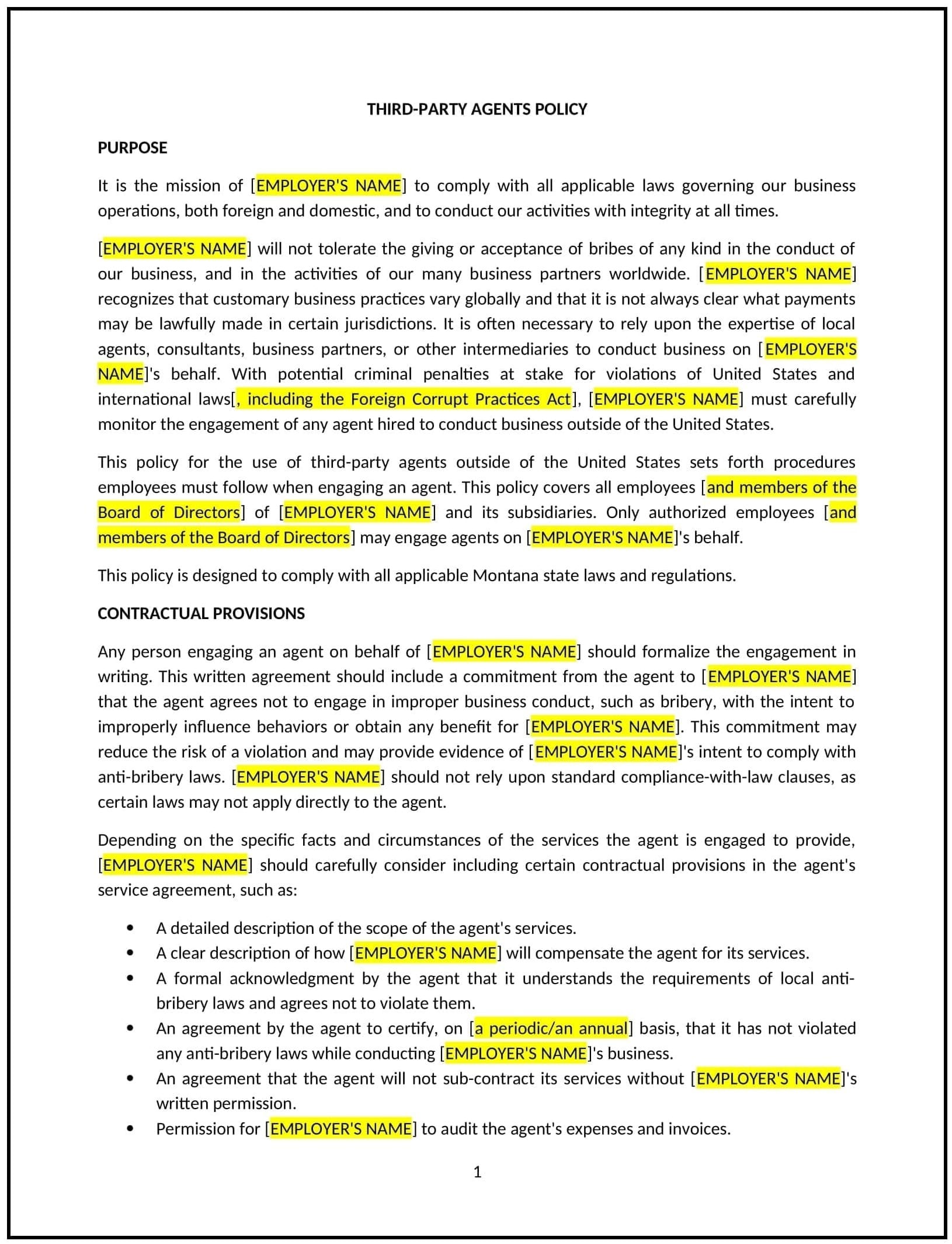Got contracts to review? While you're here for policies, let Cobrief make contract review effortless—start your free review now.

Customize this template for free
Third-party agents policy (Montana)
A third-party agents policy helps Montana businesses define the expectations, responsibilities, and procedures for working with third-party agents, including contractors, vendors, consultants, or any external individuals or organizations that provide services to the company. This policy outlines the criteria for selecting third-party agents, the process for managing their activities, and how to ensure that they align with the company’s standards, legal requirements, and ethical expectations.
By implementing this policy, businesses can mitigate risks, maintain control over external partnerships, and promote transparency and accountability when working with third-party agents.
How to use this third-party agents policy (Montana)
- Define third-party agents: The policy should specify who qualifies as a third-party agent, including contractors, consultants, and vendors, and the types of services or work they are hired to perform.
- Set criteria for selection: The policy should outline the process for selecting third-party agents, including factors such as expertise, reputation, legal compliance, and ethical considerations.
- Outline contract requirements: The policy should require that all third-party agents sign formal contracts that define the scope of work, timelines, compensation, confidentiality agreements, and any other legal obligations, including compliance with Montana state laws and industry-specific regulations.
- Ensure alignment with company values: The policy should ensure that third-party agents are aligned with the company’s values and ethical standards. This can include environmental, social, or governance criteria, depending on the nature of the business.
- Monitor third-party activities: The policy should specify how the company will monitor the performance and compliance of third-party agents, including regular audits, performance reviews, or reporting requirements.
- Address confidentiality and data protection: The policy should establish clear guidelines regarding the confidentiality of company data and intellectual property, ensuring that third-party agents protect sensitive information in accordance with legal and company standards.
- Define the termination process: The policy should specify how third-party relationships can be terminated, including the grounds for termination, the process for ending agreements, and how any outstanding obligations will be handled.
- Review and update regularly: The policy should be reviewed periodically to ensure it reflects changes in legal requirements, industry standards, and the business's evolving needs.
Benefits of using this third-party agents policy (Montana)
This policy provides several key benefits for Montana businesses:
- Reduces legal risks: By establishing clear expectations and requirements for third-party agents, businesses can reduce the risk of legal issues, such as breaches of contract or violations of data protection laws.
- Promotes consistency: The policy ensures that all third-party relationships are managed consistently, with uniform expectations for performance, ethical conduct, and legal compliance.
- Enhances business accountability: A third-party agents policy promotes transparency and accountability by requiring regular oversight of third-party activities and ensuring that agents meet company standards.
- Strengthens relationships with third parties: By clearly defining the roles and responsibilities of third-party agents, businesses can foster more productive and positive relationships with external partners.
- Protects sensitive data: The policy ensures that third-party agents are contractually obligated to protect confidential information and intellectual property, reducing the risk of data breaches or unauthorized disclosures.
- Supports business growth: A well-defined policy allows businesses to expand their use of third-party agents in a controlled and strategic manner, enabling growth while maintaining operational control.
Tips for using this third-party agents policy (Montana)
- Communicate the policy clearly: Ensure that all employees involved in working with third-party agents understand the policy and are familiar with the procedures for selecting, managing, and monitoring agents.
- Select third-party agents carefully: Take time to evaluate the qualifications, reputation, and compliance of potential third-party agents before entering into any contracts. This reduces the likelihood of issues arising later.
- Regularly monitor third-party performance: Set up a system for tracking the performance of third-party agents, ensuring that they meet the expectations outlined in the contract and comply with all legal requirements.
- Use formal contracts: Ensure that all third-party agreements are formalized in contracts that clearly define the scope of work, payment terms, confidentiality agreements, and other important clauses to protect the business’s interests.
- Maintain strong communication: Establish open and transparent communication channels with third-party agents to ensure that both parties can address any concerns promptly and work together effectively.
- Offer training to internal teams: Train employees on how to manage third-party relationships and ensure that they are aware of the company's policies and expectations regarding third-party agents.
- Review and update the policy regularly: Periodically review the third-party agents policy to ensure that it is aligned with the company’s changing needs, legal requirements, and industry best practices.